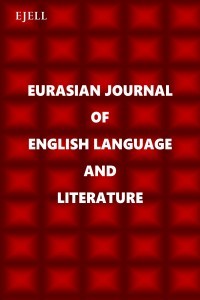The traces of post-pastoral possibilities in Dylan Thomas’s “F TG F D F” and “R M D F C L”
The traces of post-pastoral possibilities in Dylan Thomas’s “F TG F D F” and “R M D F C L”
Post-pastoral, Creative-Destructive Process, Minority Standing, Eco-poetic Paradigm Perpetual Sublimity,
___
- Ackerman, John. A Dylan Thomas Companion: Life, Poetry and Prose. Houndmills: Macmillan, 1991.
- Afrougheh, Shahram. et al., Mirzaeian, VahidReza (2013). Poets in Reflection. Arak, Islamic Azad University Press: 262-296. Bressler, Charles E (2007). Literary Criticism: An Introduction to Theory and Practice. Fourth Edition. New Jersey, P: 46.
- Cabral, Gladir da Silva (2005). ‘Death in Dylan Thomas’s poem “A REFUSAL TO MOURN THE DEATH, BY FIRE, OF A CHILD IN LONDON’ AND ITS RELATION TO THE CHRISTIAN TRADITION’. Publicatio UEPG: Ciências Sociais Aplicadas, 13 (2): 7-17.
- Daiches, David (1987). “The Poetry of Dylan Thomas.” Dylan Thomas: A Collection of Critical Essays. Ed. by C. B. Cox. New Jersey: Prentice-Hall International, pp. 14-24.
- Ellis, Abrams (2008). Psychoanalysis in theory and Practice. In Personality theories: Critical perspectives. CA: SAGE Publication, pp 111-141.
- Gifford, Terry (1999). Pastoral. New York: Routledge, pp: 146-174.
- ---------- (2006). Pastoral and the Humanities: Arcadia Reinscribed. Bristol: Exeter Bristol Phoenix Press, pp: 14-24.
- ----------. (2012). Pastoral, Anti-pastoral, and Post-pastoral as Reading Strategies. Ipswich: Salam: p.74.
- Goldson, Edward (1996). ‘The Effect of War on Children’. Child Abuse & Neglect. Vol.20. No. 9: 809-819.
- Lansky, Melvin., and Bley, Carol (1995). Post-traumatic Nightmares: Psychodynamic Explorations. NJ: The Analytic Press, p: 19.
- Leed, Eric (2000). Fateful Memories: Industrialized War and Traumatic Neuroses. Journal of Contemporary History. Vol. 35. No. (1): 85-100.
- Leitenberg, Milton (2006). Deaths in Wars and Conflicts in the 20th Century. Cornell University, Peace Studies Program. Vol.29. p: 11.
- Marx, Leo (1964). The Machine in the Garden: Technology and the Pastoral Ideal in America. Oxford: Oxford Up.
- Moallemian, Roxana., and Inoue, Kazuko (2006). ‘Cognitive Conceptions of the Metaphors of Time: An Application of George Lakoff’s Conceptual Theory of Metaphor to Shakespeare’s Sonnets’. Graduate School of Integrated Arts and Sciences. Hiroshima University: 23-33.
- Nair, M.T Vasudevan (2003). ‘A Post-pastoral Reading’. Google Book Search. pp: 129-187. http://shodhganga.inflibnet.ac.in. /bitstream/10603/2583/9/09 Novak, Joseph A (2003). ‘Substantive Syllogisms’. The University of Windsor. Google Book Search. pp:1-16.
- Perrine, L. (1987). Sound and Sense: An introduction to poetry. Chicago: Harcourt Brace Jovanovich, Inc.
- Read, Herbert (1963). The Contrary Experience: Autobiographies. New York, Horizon Press: 217-18.
- Sunderman, P. “Dylan Thomas’s ‘ A Refusal to Mourn’: A Syntactic and Semantic Interpretation.’ Language and Style: An International Journal. 20-35
- Standifer, Leon C (1998). Not in Vain: A Rifleman Remembers World War II. Louisiana State University Press
- Stephens, Raymond. The Self and World. Dylan Thomas: New Critical Essays. Ed. Walford Davies. London: J.M. Dent, 1972. 21-55
- Zohrab Baigy, Mohsen. and Zarrinjooee, Bahman (2014). ‘Giffordian Post-pastoral and Loss of Innocence in William Blake’s The Little Boy Lost and The Little Boy Found’. International Journal of Literature and Art. Vol. 2. No. 2: 35-39.
- Yayın Aralığı: Yılda 2 Sayı
- Başlangıç: 2019
- Yayıncı: Karabük Üniversitesi
The Use of Discourse Markers in Second Language Writing of Iraqi Undergraduate Students
The Problematical Representation of the Hero in The Song of Roland
The American as Mono No Aware in Kazuo Ishiguro’s “Cellists”
EXILE AND DISPLACEMENT IN KHIRBET KHIZEH, JOURNAL OF AN ORDINARY GRIEF AND I SAW RAMALLAH
The traces of post-pastoral possibilities in Dylan Thomas’s “F TG F D F” and “R M D F C L”
